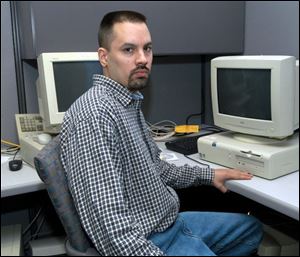
Computer docs keep students virus free
8/30/2004
'It just takes one computer to infect them all,' says Chad Hrivnyak, the university's senior network security analyst.
It's Chad Hrivnyak's job to make sure students at the University of Toledo get immunized, but not for diseases.
Instead of bottles of serum and packs of needles, he carries a CD full of computer programs, upgrades designed to patch gaps in a popular operating system and protect from spyware and viruses.
He's the senior network security analyst at UT, and these are the days he has his work cut out for him. Last year about this time, students returned to college as the dreaded "Blaster" worm and others were going around. The result: a super slow college network bogged down by chatty student computers trying to infect each other.
"The entire network came to a standstill. You couldn't get any actual work done," Mr. Hrivnyak said. "It just takes one computer to infect them all."
That's why officials at UT and other universities around the country and encouraging incoming students to take precautions as they settle on campus. Among them is Mr. Hrivnyak's CD, which includes something known as Service Pack 2 for Windows XP, an operating system used by hundreds of thousands of students.
"If we had had that last year - the firewalls on and the machines patched - we wouldn't have seen most of the problems we saw," he said.
The university is handing out the CDs to resident advisers and is asking them to make them available to all students as a precaution.
And like other colleges, UT is asking students to exercise some common sense when it comes to safe computing: use an anti-virus program, activate a firewall to protect the system from probing, and keep the operating system patched. In general terms, be wary - don't give out personal information and don't respond to e-mail solicitations.
Bowling Green State University has enhanced virus protection on its systems this year and sends out a newsletter regularly to educate students. Even so, it experienced its first network hiccup of the year earlier this week when its residential network connections went down briefly because of rogue computers.
On Thursday, its network was bombarded by about a dozen computers brought by students that were compromised and, unbeknownst to the students, were used as part of a larger coordinated attack to overwhelm a Swedish university's network.
BGSU officials said the attack was brought under control and its network returned to normal in about an hour, but it left about 10 percent of student computers compromised. Officials are working now to identify the affected students, clear up those problems, and warn students that they need to be wary.
"Viruses are not benign," said Kent Strickland, information security officer. "Today's viruses contain back doors. Through them attackers can gain full control of your computer."
At Siena Heights University in Adrian, Michigan, officials aren't allowing students to connect computers to the school's wireless network until they register it and prove that it has anti-virus software and a year's subscription to keep it updated. So far, response has been good, said Alan Ballenberger, network manager for the university.
"The level of awareness is much more this year and people are coming in prepared," he said.
In many instances, students have the software tools to combat malicious programs. They just need to make sure they use them, officials said.
"Some students, they don't understand or its annoying to them so they just turn it off," said Steve Stempien, director of information service at Adrian College in Michigan.
"If you turn it off, those vulnerabilities will be exploited and you're going to end up with junk on your computer."
Contact Ryan E. Smith at: ryansmith@theblade.com or 419-724-6074.